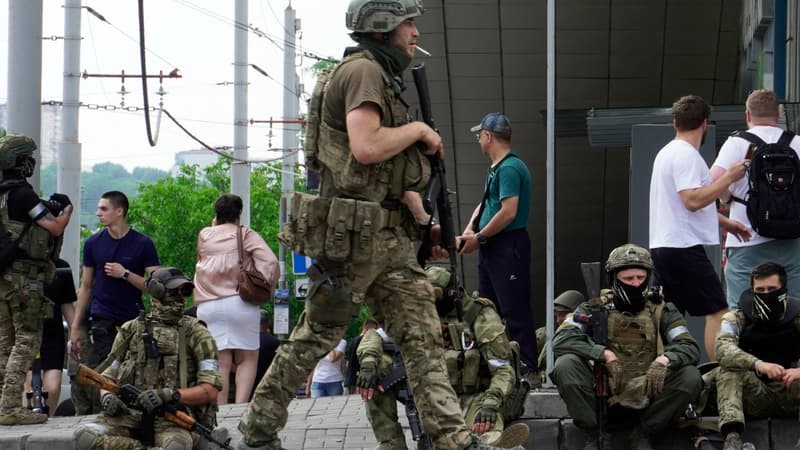After reaching an agreement with the Kremlin, Evgeny Prigokhine, head of the Wagner paramilitary group, finally announced at the end of the day that his men were “returning” to their camps to avoid a bloodbath with the Russian security forces.
While Wagner’s armed rebellion in Russia is officially over, many unanswered questions remain. Among them, the fate reserved for the 25,000 mercenaries of him.
preserved militia
Wagner’s troops present in Russia must return to their camps. They have already left the Lipetsk and Voronezh regions, south of Moscow, as well as the city of Rostov, this Sunday morning.
Prigojine managed to ensure that his militia, which was to be part of the Russian army, was not dissolved and that the criminal investigation against him was abandoned, while he was incorporated into Belarus. According to US intelligence, “in the deal, there would be the head [du ministre de la Défense russe Sergueï] Shoigu and [du chef d’état-major de l’armée Valeri] Guerassimov, what Prigojine wanted,” said Patrick Sauce, a foreign policy columnist for BFMTV.
The men who participated in the operation will also escape any prosecution, according to the Kremlin. “No one will persecute the fighters, given their merits at the front” in Ukraine, says Kremlin spokesman Dmitry Peskov. Earlier, Russian President Vladimir Putin promised “traitors” to the Russian nation that they would be “punished.”
Possible contracts with the Russian Defense
Since then, the Russian presidency has stated that this attempted rebellion “will in no way affect” the war in Ukraine. However, the fighters can be hired by contract by the Russian Defense Ministry, according to Vladimir Putin’s spokesman.
“An agreement has been reached for the troops of PMC Wagner to return to their camps and places of deployment. Some of them, if they wish, can then sign contracts with the Ministry of Defense,” Dmitry Peskov said. “This also applies to the combatants, who have decided not to participate in this ‘armed riot’.”
“Most of the mercenaries will not join the Russian regular army,” assumes for his part Marat Gabidullin, a former member of Wagner, who answered questions from BFMTV this Sunday, because of the pay and “a certain contempt of Wagner’s men towards this Russian army.”
A few days before the Wagner Group went into rebellion, the Kremlin did not offer these contracts, instead planning to require all volunteer groups to sign an agreement with the Defense Ministry before July 1. Yevgeni Prigojine was then vehemently opposed to depending on a ministry “privatized by a group of individuals”. He then accused the Russian army of missile attacks on their rear camps.
Continuation of external operations
Wagner can also still bind contracts outside of Russia, to “meet the specific needs of countries or companies that don’t pay much attention to the qualities and discipline of these types of units,” says General Jerome Pellistrandi. These mercenaries have very different profiles, ranging from “criminals recruited from prisons for the battle of Bakhmout” to “expert ex-soldiers and airplane pilots,” he explains.
Many are deployed abroad. In Mali, the military junta in place uses around 1,500 Wagner staff members. Along with Burkina Faso, these two countries should maintain their security partnership with Moscow.
According to General Jérôme Pellistrandi, the Soukhoï Su-25, the ground support planes delivered by Moscow to Malian forces a few months ago, need pilots supplied by Wagner.
The private security company also carries out private security operations in several countries that provide it with a juicy payment in kind, often from looted resources. His mercenaries are thus used to defend oil installations, monitor tropical timber exploitation or search for gold mines, in Madagascar, the Central African Republic, Mozambique or even Sudan.
Belarusian exile
The deal with the Kremlin, concluded under the auspices of Belarusian President Alexander Lukashenko, also allows Wagner’s boss to join Belarus.
He goes alone? “He will certainly be surrounded by his close guard, from fifteen to one hundred [de personnes]it will depend on the agreement negotiated with Lukashenko”, hypothesizes General Jérôme Pellistrandi, defense consultant for BFMTV.
According to General Lord Richard Dannatt, former Chief of Staff of the British Army, Prigokhine’s departure for Belarus must be closely watched by the Ukrainians.
“The fact that he has gone to Belarus is cause for concern,” he told Sky News.
If he has “maintained an effective fighting force around him, then he again poses a threat to the Ukrainian flank closest to kyiv, where the war started,” he added. According to this general, “it is very possible” that Russia uses Wagner’s group to try to retake kyiv.
Source: BFM TV


